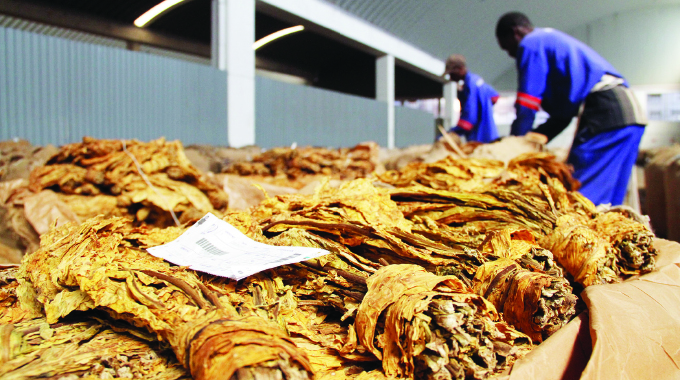Stakeholders must help TIMB enforce Covid-19 protocols effectively

Obert Chifamba Agri-Insight
THE general feeling globally is that the current lull in Covid-19 cases might be heralding the beginning of its end, hence the decision by some countries to relax some or most of the preventive regulations that had been in force for the past three years.
In Zimbabwe, the situation is different, with the Government adopting a very cautious approach to the way the pandemic is handled.
With less than 24 hours remaining before the 2022 tobacco marketing season opens tomorrow, the Tobacco Industry and Marketing Board (TIMB) is not leaving anything to chance and has clearly spelt out how stakeholders will be expected to do their business as far as observing Covid-19 regulations is concerned.
In a recent report on its state of preparedness for the 2022 tobacco selling season, TIMB unequivocally indicated that all selling points would be expected to actively spearhead Covid-19 awareness campaigns at their respective premises, including displaying relevant posters and fliers while on its part it will enlist the help of all relevant authorities, which include the Zimbabwe Republic Police (ZRP) and local government authorities, to enforce the complete closure and removal of all flea markets and vendors around the perimeters of auction and contract sales floors ahead of and during the entire marketing season.
This move by the board will serve as the proverbial stitch in time that will save a possible nine.
If stakeholders are allowed to take a relaxed approach like what is happening elsewhere outside our borders, chances are very high the tobacco marketing season may easily turn into a super-spreader of the virus in the event that there is an outbreak given that there will be a lot of human traffic and activities.
The decision to notify farmers of their tentative selling times at the point of booking with only one farmer or representative allowed to attend the sales will obviously eliminate people who usually come to the floors just for fun or some other business and is therefore laudable.
If TIMB succeeds to enforce its “deliver today and sell tomorrow” policy throughout the season, that will be a major score in the battle to eliminate Covid-19 and will require banks to reciprocate the gesture by establishing banking facilities at sales floors that also meet all Ministry of Health and Child Welfare set Covid-19 guidelines.
On the one hand, farmers should also play ball and deliver their tobacco between 0600hrs and 1700hrs and not come at any other time.
In a way, this will also reduce cases of tobacco theft en-route to the floors, especially during the night like what was happening last season.
It is also refreshing to note that there will be foot baths, full body cover mist sanitising sprays and hand washing facilities, comprising running water with either an alcohol-based disinfectant or soap at the floors’ entrance gates for use before entry, during and after sales.
All vehicles driving into the selling points should be sprayed, while canteens will follow all Ministry of Health regulations and only serve take-away meals with strictly no sitting arrangements, which will, however, be reviewed in line with further developments in national Covid-19 regulations.
TIMB should also closely monitor floors to ensure everyone is wearing face masks from floors’ staff members, buyers, TIMB officials and farmers while all sales points should have at least one qualified state registered nurse on site.
The board’s decision to licence and co-ordinate all tobacco transporters will also help eliminate fly-by-night transporters known to give farmers raw deals every season.
TIMB has also done well to abolish farmer sleepovers at the floors and instructed floors not to offer overnight accommodation to farmers, no matter the circumstances.
Sales premises should be cleaned and sanitised during the night, hence the need to have them vacant of people while non-essential staff members will be encouraged to work from home.
One method of ensuring that farmers cut on the frequency of coming to the floors every now and then is through consolidating their deliveries so that where they would have come many times, they do so only once or twice and they are done.
Such a practice will also minimise their chances of getting exposed to the virus or them exposing others to the virus in the event that they are positive.
The idea of decentralising floors to other parts of the country, other than Harare, will also help cut on the numbers of people coming to town to deliver their crop, which will allow the season to move faster and smoothly. It also means that floors will not be overwhelmed by the deliveries and will therefore attend to the numbers that would have come through efficiently.
What is also more exciting is the fact that this season, farmers shall be paid 75 percent of their sales proceeds in foreign currency and the 25 percent portion shall be paid in local currency, converted at the prevailing auction exchange rate on the day of sale.
The 75 percent portion shall be paid directly into the growers’ foreign currency accounts and shall be treated as free funds while the 25 percent local currency portion shall be deposited into the growers’ local bank accounts or e-wallets.
Last season the foreign currency retention percentage was 60 percent, which left the majority of farmers feeling hard-done citing that the percentage ratio was failing to address their plight as charges for most services and commodities required in the production of the crop were quoted in foreign currency.
The success of TIMB’s noble intentions will also depend on how stakeholders in the value chain treat the matter.
They also need to realise that Covid-19 cases might have gone down but that may not be the end of the problem, as fresh cases can easily sprout if people become reckless and lose their guard.
It is therefore critical for everyone, especially the farmers who will be the central players in the process to observe the regulations religiously and save lives.
Other players such as the police and the local authorities must also be visible and make their presence felt throughout the season so that would-be offenders will think twice before putting the lives of many other people at risk by flouting the prevailing Covid-19 regulations.










Comments